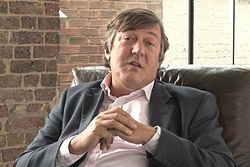Friends' Newsletter/2014/Issue 01
All new friends newsletter
Welcome to the new-look Friends of Wikimedia UK newsletter!
Each month we'll be sharing insights into the work being done by the volunteers and staff of Wikimedia UK. You'll find information about past and future events, get the latest on developments on the Wikimedia projects and snapshots of Wikimedia projects in the news. This month's edition is packed full with news and highlights, including an innovative way that Stephen Fry has shown his support for Wikipedia. There's also plenty of detail about the way the charity works - for example, this month we're taking a look at the new five year strategy.
More than just news and updates, we want to make sure that there's plenty of ways to participate in the work of the charity - whether you're a long-time contributor to Wikimedia projects, or someone who admires them as a reader, we'd love for you to get involved. This month, featured opportunities include a workshop about Wikidata, one of the newest Wikimedia projects, and an editathon at the University of Liverpool.
Trustees and staff will also be introducing themselves, with a different person in the hot seat each month. This time Stevie Benton, our Head of External Relations, offers his reflection on two years working for the charity. And do let us know what you think of the newsletter - it's issue one, so there's bound to be room for improvement. Send your feedback to volunteering![]() wikimedia.org.uk.
wikimedia.org.uk.
Upcoming: Wikidata workshop
Wikidata is a free knowledge base that can be read and edited by humans and machines alike. It is for data what Wikimedia Commons is for media files: it centralises access to and management of structured data, such as interwiki references and statistical information. Wikidata contains data in every language supported by the MediaWiki software. It is a free, collaboratively edited knowledge base project operated by the Wikimedia Foundation.
Wikimedia UK is hosting a one day workshop on Saturday 26th April 2014 at Development House in London for interested Wikimedians to learn about new developments in Wikidata, find out more about the "tools ecosystem", for new editors to find out what Wikidata is, and for everyone to try their hand at contributing to Wikidata.
The event will be led by Magnus Manske and Joe Filceolaire. Magnus was the original author of the PHP script that evolved into MediaWiki, and is behind many popular scripts and tools used across Wikimedia projects, including Reasonator. Joe has been an active Wikidata contributor since the project launch, with over 13,000 edits to date.
Don't forget to book your place here.
Upcoming: Wikipedia editathon
Do you want the chance to improve Wikipedia science coverage? Would you like to find out more about, and discuss, the issues surrounding women in science? We are running a two-part event, consisting of a Wikipedia editing session and an evening panel discussion. You can choose to participate in both, or just one of them, on Tuesday 13th May 2014 at the University of Liverpool.
Working with Wikimedia UK and the Medical Research Council, the University of Liverpool is organising a Women in Science-themed editing event. This event builds on the success of the first such event run by the Royal Society in October 2012, and now also features the MRC. Event attendees will be helping to create or add to the Wikipedia articles about female scientists (who tend to be under-represented on Wikipedia), and attract more female editors to the project.
In addition we are pleased to announce that there are 90 places available for an evening Women in Science reception and panel discussion to serve as a forum on women's experiences in science (5:00 – 7:30pm). This includes a talk by Professor Dame Julia Higgins, who will be accompanied on the panel by Professor Sue Wray, Professor Tara Shears, Professor Ian Greer (TBC) and two MRC Fellows, Dr Lauren Walker and Dr Sarah Skeoch. Come along to discuss how women can be better represented in science and hear how female scientists' careers have flourished.
The events are open both to people who are new to Wikipedia and experienced Wikipedia editors alike. Female would-be editors are particularly encouraged to attend.
Attendance is free, but booking through EventBrite is essential. Find out more about the event here.
Conference scholarships
As a part of Wikimedia UK's continued efforts to support the Wikimedia community the the UK, we regularly offer scholarships to enable attendance at international conferences and meetings. Past scholarships have enabled members to attend previous years' Wikimania, WikiSym and Wikimedia Hackathon events, such as the 2013 Hackathon event in Amsterdam. This year, as a result of our support, Wikimedians in the UK have been able to attend the European Parliament in Strasbourg to take photos and videos of European Parliament members and attend the EduWiki conference in Belgrade, Serbia to share Wikimedia UK's experiences from our education-related outreach activities.
Two further scholarship opportunities are now available, the first for Open Knowledge Festival and the second to OpenSym. OKFestival, run by the Open Knowledge Foundation is an open data and open knowledge conference that will bring together over 1,000 people from more than 60 countries in a bid to encourage innovation in the open sector through sharing experiences and skills. Furthermore, the event is a celebration of the open movement itself and what it has already achieved. OpenSym, previously known as WikiSym, is the International Symposium on Wikis and Open Collaboration where researchers from all over the world gather to present their latest research and practice on "open access, open data, open education resources, IT-driven open innovation, open source, wikis and related social media, and Wikipedia". Both of these conferences are being held in Berlin, Germany with OKFestival on 15th-17th July and OpenSym on 27th-29th August.
To qualify for either scholarship, you must be based in the UK, be able to travel to Berlin and attend all days of the event, and agree to produce a public report (which may be published on the Wikimedia UK blog and in our newsletters) summarising the key things that you have taken from the event. Applicants for OpenSym must also be engaging in research about Wikimedia or other free content projects. The scholarship will cover conference registration fee, travel, accommodation, along with a per diem allowance to cover local expenses.
Complete this online form by Sunday 20th April to apply for a scholarship to OKFestival. The deadline for OpenSym scholarship is Sunday 30th April, and you can apply here.
Hello from the Office: Stevie Benton
Reflections on two years in post
They say that the passage of time is relative, and I agree. The last two years have passed both extremely quickly and yet slowly.
I've been working for Wikimedia UK for two years now, having started on 19 March 2012. The process of recruitment happened in the blink of an eye. The advert had been shared with me by a friend, but it wasn't until the closing date I decided to apply. A week later I was rushing over from my previous job to get to the office for an interview – not having time to even change into a suit – and three days later, I'd been offered the position.
I've always been an admirer of what Wikipedia represents – a great collective effort to share knowledge, for free, with everyone on the planet. My own meagre contributions to that effort had been to correct some typos when I found them, and to remove vandalism when I encountered it. I registered an account, but it seems I'd never used it, inadvertently editing as an IP. I didn't consider myself enough of a subject expert to make other kinds of contributions, but the opportunity to support Wikipedia and the other projects in a professional capacity was exciting. Two years later, it still is. Wikimedia UK has changed quite a lot since those days and we've been involved in some great successes, such as Wiki Loves Monuments. We've had some challenging times as well. Being involved in a growing, evolving organisation as its fourth member of staff has been a richly rewarding experience.
We are moving into a new phase of operations now. We have an agreed strategic plan that focuses on delivering impact. We are consolidating our high level partnerships, for example through our Wikimedian in Residence programme, and we are looking at ways to deliver increased impact through the projects we support. Over the next few months I expect to be able to announce some exciting and interesting partnerships and of course, we have Wikimania 2014 to look forward to in August. We're taking steps to build closer links with other "open" organisations and beginning to take a leading role in advocating wider changes that support our vision of open knowledge for all.
It's an exciting time for our charity and I thank all of those volunteers and staff that make my role such an interesting and fulfilling one.
Stephen Fry records his voice for Wikipedia
Stephen Fry wears many hats – wit, television presenter, actor, writer and geek. He now has a new hat to wear: Wikipedia contributor.
Stephen was approached by Wikipedia editor Andy Mabbett, who founded the Wikipedia voice intro project (WikiVIP). Although in New York at the time, Stephen willingly obliged and recorded a sample of his speaking voice for use on his Wikipedia biography.
The project asks people who are the subject of Wikipedia articles – whether they are celebrities like Stephen Fry, or those notable for other activities like scientists or artists – to make short recordings of their voice, lasting around ten seconds or so. The recordings are then uploaded to the article so that Wikipedia's readers know what they sound like and how to correctly pronounce their names. Contributors to the project so far include lunar astronaut Charlie Duke and Baron Knight of Weymouth, a peer of the United Kingdom. You can listen to all of the voice recordings made for the project so far here on Wikimedia Commons or on the appropriate Wikipedia articles.
Once the recording of Stephen's voice was uploaded and added to his biography, Andy also transcribed it as timed text captions which are displayed as the audio plays.
Andy has also been working with the BBC on a project to extract similar clips from certain BBC programmes. Significantly, this is the first time that the BBC have openly licensed content from their broadcast programmes.
At an event at New Broadcasting House earlier this year, volunteers identified over three hundred clips which the BBC reviewed, processed, and then uploaded to Wikimedia Commons. Wikipedians have since been inserting them into relevant Wikipedia articles. Examples added to articles so far range from multiple Olympic gold medallist Michael Johnson to Nobel Peace Prize winner Aung San Suu Kyi.
You can help the Wikipedia voice intro project by asking people you know who are the subject of Wikipedia articles to make recordings of their voices in any language in which they're comfortable (the project is not just for English speakers). You can also help to transcribe the existing files into timed text captions.
And if you happen to be the subject of a Wikipedia article, why not record a sample of your voice? If you'd like more details of how you can get involved in the voice project, or Wikipedia in general, please email stevie.benton![]() wikimedia.org.uk.
wikimedia.org.uk.
Wikimedia UK's five year strategy
Over the last few months we have been working on bringing together our long term strategy. This has involved building on your expertise (and the earlier strategy drafts), the expertise at the Wikimedia Foundation and within the wider movement, and other third sector expertise. Fundamentally what we've tried to do is define the outcomes that we, as a movement, are seeking; what impact do we want to make? The strategy makes it clear that in order for us to deliver on those outcomes, we must track certain things within our programmes. Without you, the members and volunteers, we cannot deliver programmes. Without you, we'll also really struggle with tracking our outputs - and we look forward to productive discussion around how mutual support for this (including tech) can be built between staff, volunteers and the wider community. The result of this effort has now been formally adopted by the board as our five year strategy.
The strategy sets out not only our mission ('to help people and organisations create and preserve Open Knowledge, and to help provide easy access for all') but also the way in which we aim to achieve that in practice. To ensure that our day-to-day activities are closely focused on attainment of our mission, we have committed to record and publish a wide range of measured outcomes which will indicate, on an ongoing basis, how we are performing against a range of strategic goals. These measured outcomes will build up over time into a comprehensive picture of the practical impact the charity has been able to make.
In preparing the strategy we consulted widely with the Wikimedia UK community, the Wikimedia community at large, other chapters, the Wikimedia Foundation, and interested individuals. The draft strategy documents were open for public consultation during the month of February, and feedback received was taken into account along with staff and board contributions. We have replied to the community feedback on-wiki.
We are confident that as the end result of this process we have a robust strategy that will serve us well in the years to come. It will enable us to maintain and track challenging but achievable targets while retaining operational flexibility to focus our day-to-day efforts on whichever individual activities and initiatives will best help us achieve practical impact. We thank everyone who has contributed to the process, and we look forward to continuing to work with the community with renewed focus and vigour.
Quick updates
In the News
- Is Wikipedia the Next Frontier for Museums?
- Thousands of years of visual culture made free through Wellcome Images
- Fixing Wikipedia's gender bias, one edit at a time
- America's future doctors are starting their careers by saving Wikipedia
- New York Times Has Been Editing Reporters' Wikipedia Pages For Years
- Wikipedia Archiving Voices So You'll Always Know How Celebs Sound
- New app tracks Wikipedia edits by Internet bots and humans
- WikiPeaks?
- Change the Worldview! Become a Wikipedia Editor!
- Warming Up to the Culture of Wikipedia
- Berkeley's Wikipedian-in-residence is a first
- Wikipedia To Redesign Across More Than 32 Million Pages
- Printing Wikipedia Would Take 1 Million Pages, But That's Sort Of The Point
Community Chat
The Wikimedia Foundation has released its latest Annual Report, covering the fiscal year of July 2012 to June 2013, celebrating "Ten years of sharing and learning". The Wikimedia Foundation has also, after a lengthy search process, appointed Katherine Maher as Chief Communications Officer, replacing Jay Walsh. Maher previously worked as Advocacy Director for Access, a global digital rights organisation.
Greek Wikipedia editor Diu is being supported by the Wikimedia Foundation through its Legal Fees Assistance Program in his defense of a defamation lawsuit against him by politician and academic Theodore Katsanevas. A pre-preliminary injunction obtained by Katsanevas resulted in unflattering statements about Katsanevas being removed from his biography on the Greek Wikipedia before being reinserted by another editor.
Typography on the desktop versions of all Wikimedia wikis are being updated this week, which will result in increased text size for body content and headings, among other changes. In the longer term, the Wikimedia Foundation is exploring serving webfonts to all its users to ensure consistent rendering among different devices, especially when serving up content in non-Latin scripts.
Wikimedia Commons Picture of the Year 2013
The Wikimedia Commons Picture of the Year 2013 competition has concluded, with the result announced on 26th March.
In 2013, 962 images were awarded featured status by the Wikimedia Commons community. Voting took place over two rounds, with all images classified into different categories in the first round based on their subject. During Round 1, editors were allowed to vote for as many images as they liked with 50 finalists going forward to the second round comprising the top 30 vote getters from Round 1 and top two in each category. In total, 4,070 editors voted during either rounds of the competition, with 2,919 selecting their favourite from the finalists in Round 2.
The winning image by Stefan Krause show a damaged lightbulb with tungsten filament burning with smoke raising. Just two votes behind, is Balkhovitin's photo of "Sviati Hory" (Holy Mountains) National Park in Donetsk Oblast, Ukraine uploaded as part Wiki loves Earth competition. Third place was taken by a photo of a swallow drinking, taken by Nicolas Sanchez.
Picture of the Year is an annual competition that first ran in 2006 and aims to identify the best images awarded Featured picture status during that calendar year.










